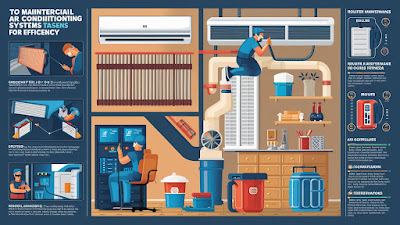Proper maintenance of air conditioning systems in commercial environments is essential to ensure their efficiency and longevity. In companies, stores and offices, where the flow of people and equipment is constant, heavy use of the air conditioning is inevitable. Therefore, keeping the system working properly not only improves thermal comfort, but also helps save energy and reduce repair costs.
1. Why is maintenance important?
A lack of regular maintenance can cause several problems in the air conditioning, such as decreased performance, increased energy consumption and even complete system failures. In commercial environments, where the air conditioning usually runs for long hours, these problems can directly impact the comfort of employees and customers, in addition to impairing the operation of heat-sensitive electronic equipment.
2. Main preventive maintenance practices
Preventive maintenance is essential to avoid failures and ensure the proper functioning of the air conditioning. This includes cleaning the air filters, which should be checked regularly to ensure that they are free of dust and dirt. In addition, it is important to inspect the condensing and evaporating units, check the refrigerant gas charge and make adjustments to the electrical components to prevent premature wear of the parts.
3. How to ensure energy efficiency?
A well-maintained air conditioning system is also more efficient in terms of energy consumption. Checking the thermal insulation of the air ducts, ensuring that there are no leaks and correctly adjusting the thermostat are some practices that can reduce energy consumption. Periodically changing the filters and cleaning the coils are also effective measures to improve energy efficiency and ensure that the system works with less effort.
Ensuring regular maintenance of the air conditioning in commercial environments not only extends the useful life of the equipment, but also improves performance, reduces operating costs and promotes a more comfortable environment. To ensure efficiency, it is essential to follow a preventive maintenance schedule, perform periodic inspections and have qualified professionals to perform the services. This way, the system will work efficiently, avoiding problems and unexpected expenses.
